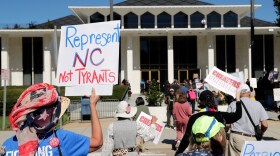In an order issued Friday, the North Carolina Supreme Court's newly minted conservative majority sided with Republican lawmakers and granted their request to rehear two otherwise settled cases with major implications for future elections in the state.
House Speaker Tim Moore (R-Cleveland), Senate President Pro Tem Phil Berger (R-Rockingham) — whose son, Phil Berger, Jr., is one of the state Supreme Court's five Republican justices — and other GOP lawmakers have been seething ever since losing the cases last year, one over redistricting and the other over photo ID requirements for in-person voting.
When Democrats held a slim 4-3 majority, until last year's midterms, they ruled for voting rights advocates in the two cases. One found Republican-drawn district maps had unconstitutionally manipulated political boundaries for excessive partisan advantage, and two, that — as implemented — a mostly GOP-backed ID law would disparately affect Black voters.
Request for rehearing came after the midterm elections reshaped the composition of the high court
But Republicans swept November's statewide judicial races, including two seats on the Supreme Court, turning the 4-3 edge for Democrats to a 5-2 advantage for GOP justices.
After Republican gains at the polls in November, Moore and his GOP colleagues at the North Carolina General Assembly wasted no time in asking the high court's new conservative majority to consider reversing course in the settled matters. And it was one of the new Republicans on the court that rendered the prevailing opinion in the order granting the lawmakers' request.
"This court has consistently allowed a petition for rehearing when the petitioner has made the showing required by Nowell," wrote Justice Trey Allen, citing a 1959 medical malpractice case as the central basis for the majority's opinion.
Nowell involved a woman who had accused her doctors of malpractice, lost in court, and kept filing lawsuits to harass them.
The Nowell court did not grant the woman's request for rehearing but merely said that a rehearing is "the appropriate method of obtaining redress from errors committed by this court."
And the line of cases cited by Allen in his opinion involve fact-intensive matters of negligence and contracts from as far back as 1910 where the courts had overlooked or failed to consider key details that could have affected the outcome at trial.
Allen's majority opinion is anything but consistent with court precedence, according to the dissent written by Justice Anita Earls, one of the high court's two remaining Democrats.
"The majority’s order fails to acknowledge the radical break with 205 years of history that the decision to rehear this case represents," Earls wrote.
According to Earls's dissent, "data from the Supreme Court’s electronic filing system indicate that, since January 1993, a total of 214 petitions for rehearing have been filed, but rehearing has been allowed in only two cases." And those, again, were negligence actions where the court granted rehearing petitions for the limited purpose of reviewing specific, overlooked evidence central to the cases, not, as Earls argued, "to consider abolishing a constitutional right that belongs to millions of voters."
There's 'nothing constitutionally conservative' about the court's decisions, dissenting justice says
For Earls, it seemed clear that the real basis for the majority's order granting a rehearing was the change to the court's composition, not case law.
"There is nothing constitutionally conservative about the Court’s decisions to allow rehearing in these cases," Earls wrote in her dissent, with the other Democrat, Justice Michael Morgan joining.
"Not only does today’s display of raw partisanship call into question the impartiality of the courts, but it erodes the notion that the judicial branch has the institutional capacity to be a principled check on legislation that violates constitutional and human rights," Earls concluded.
Per Friday's order, Moore and his fellow legislative defendants must file additional legal briefs by Feb. 17; the plaintiffs and voting rights advocates in the matters have until March 3 to file their responses.
A rehearing will be set on the court calendar for the week of March 14, to determine, in part, whether congressional and legislative district maps utilized last year are effective for future elections.
Under last year's congressional map, redrawn by court order, the state's 14 U.S. House seats split evenly, 7-7, between Republicans and Democrats. The congressional map had replaced one that likely would have yielded either a 10-4 or even 11-3 advantage for GOP candidates, according to redistricting experts.






